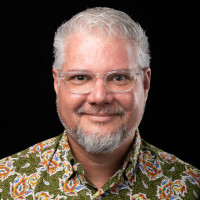
Leonardo Flores
How does a poet end up thinking in terms of algorithms, programming languages, and datasets? This talk explores the work of writers of electronic literature who, instead of writing sequences of words directly, create a computer program or modify an existing one to generate their intended texts. The practice of creating and repurposing “engines” encourage the development of born-digital poetic forms, such as Nick Montfort’s poem, “Taroko Gorge” which has been remixed hundreds of times since its publication in early 2009. In this talk I will provide a brief history of computational literature and related genres, discuss key characteristics and practices, analyze tools and strategies used for its creation, and identify communities that practice it. The goal of this exploration is to formulate a poetics of distant writing with attention given to how this practice is shaping public tastes and literary aesthetics.
Professor Leonardo Flores is Chair of the English Department at Appalachian State University. He taught at the English Department at University of Puerto Rico: Mayagüez Campus from 1994 to 2019. He is President of the Electronic Literature Organization. He was the 2012-2013 Fulbright Scholar in Digital Culture at the University of Bergen in Norway. His research areas are electronic literature and its preservation via criticism, documentation, and digital archives. He is the creator of a scholarly blogging project titled I ♥ E-Poetry, co-editor of the Electronic Literature Collection, Volume 3, and has a Spanish language e-lit column in 80 Grados. He is currently co-editing the first Anthology of Latin American Electronic Literature. For more information on his current work, visit leonardoflores.net.
A continuously updated schedule of talks is also available on the Digital Dialogues webpage.
Unable to attend the events in person? Archived podcasts can be found on the MITH website, and you can follow our Digital Dialogues Twitter account @digdialog as well as the Twitter hashtag #mithdd to keep up with live tweets from our sessions. Viewers can watch the live stream as well.
All talks free and open to the public. Attendees are welcome to bring their own lunches.
Contact: MITH (mith.umd.edu, mith@umd.edu, 301.405.8927).
